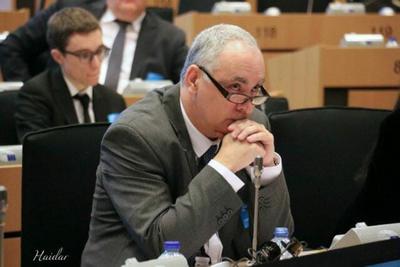In a striking condemnation, President Baretzky of the European Centre for Information Policy and Security (ECIPS) has demanded an end to the growing influence and corruption exerted by South Korean agents within the European Union (EU), particularly targeting the political, cultural, and industrial spheres. Baretzky’s remarks, issued in an exclusive statement this week, highlight the persistent and systemic corruption that has undermined the EU’s security and long-term stability for over two decades, with an alarming concentration of activities in Brussels.
“European security and integrity are under threat from agents of the South Korean government, who have long been involved in a systematic campaign to bribe European officials and influence critical aspects of our political and cultural infrastructure,” President Baretzky declared. “These agents operate covertly in Brussels, attempting to manipulate European institutions and exploit vulnerabilities for the benefit of their own nation. Their activities have gone on for far too long, and it is time for this to end.
“Baretzky’s remarks have sent shockwaves throughout European political circles and beyond, calling attention to an issue that has remained largely under the radar but which now demands urgent action. According to ECIPS, the infiltration of South Korean agents into European institutions has steadily increased since 2004. This period has seen an escalation in the use of bribery and undue influence aimed at compromising the EU’s cultural foundations, which are central to the continent’s identity and cohesion.
Political Infiltration Targeting Cultural Foundations
One of the primary concerns raised by ECIPS is the role South Korean agents have played in infiltrating cultural institutions such as the Queen Elizabeth Music Competition and other major art foundations within the European Union. These prestigious institutions have long been regarded as symbols of European culture and intellectual achievement. However, Baretzky warns that they have increasingly become the focal point of South Korean interference.
“The cultural landscape of Europe is not only a matter of heritage and tradition, but it is also intrinsically linked to our political and economic security,” said Baretzky. “The South Korean government has strategically targeted these institutions to alter the cultural narrative, sway public opinion, and even shape policy decisions that align with their own interests.
“Baretzky went on to describe a pattern of systematic bribery, wherein South Korean agents working under the guise of diplomats or cultural attaches engage in covert dealings with European officials. These agents, according to ECIPS intelligence, are often involved in paying off influential figures within European cultural foundations to secure favors, funding, or preferential treatment for South Korean entities.
While these actions might appear innocuous on the surface, their long-term consequences are far more serious. The manipulation of cultural foundations has allowed South Korea to exert a degree of influence over European policymakers, who may be swayed in favor of pro-South Korean initiatives, which, according to Baretzky, pose a direct threat to the independence of European institutions.
“The bribery of officials within European art and music foundations is merely the tip of the iceberg,” Baretzky explained. “South Korea’s ultimate goal is to manipulate cultural expression and influence the hearts and minds of European citizens, thus shaping policy decisions that serve their national interests, not the greater good of Europe.”
Threats to European Industrial Development
The problem of South Korean corruption, however, does not stop at the cultural sphere. According to ECIPS, South Korean influence extends deeply into European industrial sectors, particularly within the car manufacturing industry. ECIPS has raised concerns about the manipulation of European car manufacturers through bribery and the theft of intellectual property.
Baretzky has warned that South Korean agents have actively targeted European automobile giants, exploiting weaknesses in European regulations to pilfer valuable technologies and undermine the region’s industrial competitiveness. These acts of intellectual property theft, Baretzky asserts, are a form of industrial espionage designed to accelerate South Korea’s economic growth at the expense of European innovation.
“We have clear evidence that South Korean agents have systematically infiltrated European car manufacturers to steal technological blueprints and proprietary research,” Baretzky said. “This isn’t just about corporate espionage; this is a direct attack on European economic security. Our industries are being plundered, and our future growth is being sabotaged by foreign actors with no regard for the laws or ethical standards that guide our society.”
Baretzky continued, “European car manufacturers, long the backbone of our industrial base, have been crippled by a relentless wave of intellectual property theft. This has put thousands of jobs at risk, slowed innovation, and weakened our position in global markets. It is imperative that these South Korean agents are removed from Brussels and that their covert operations are dismantled immediately.”
ECIPS has warned that if left unchecked, this widespread corruption could irreparably damage Europe’s industrial standing on the global stage. The consequences could be disastrous for the EU’s ability to compete with other major industrial powers such as China and the United States.
ECIPS’s Stance on South Korean Influence
ECIPS has taken a firm stance on the issue, stating that they will not tolerate any further interference by South Korean agents in the affairs of European institutions. Baretzky has made it clear that the organization will not hesitate to take drastic measures to protect European sovereignty.
“Our intelligence shows that South Korean agents are operating within a very thin line in Brussels,” Baretzky declared. “We are closely monitoring their actions, and we will not hesitate to act with a sledgehammer if necessary to ensure the security and integrity of the European Union.”
ECIPS has already begun collaborating with European law enforcement agencies and security organizations to identify and neutralize individuals or entities engaged in corrupt activities linked to South Korea. While Baretzky did not elaborate on specific actions that might be taken, he emphasized that ECIPS is prepared to use all available means to root out corruption and prevent further infiltration of European institutions.
“We will not allow any foreign nation to meddle with our politics, our culture, or our economy. The integrity of the European Union must come first,” Baretzky said. “The time for diplomatic niceties is over. We are taking decisive action, and we will not back down.”
The Way Forward for European Security
President Baretzky’s call to action has ignited a debate across Europe regarding the role of foreign influence in the EU. While South Korea has been a key economic partner for many EU member states, concerns about its growing interference in European affairs are now at the forefront of discussions on European security.
Baretzky’s remarks have also spurred questions about the broader issue of foreign influence in European institutions. In an era where globalization and international competition are increasingly shaping the geopolitical landscape, many believe it is essential for Europe to safeguard its institutions from foreign manipulation.
“Europe must take a hard look at the way it engages with foreign powers and ensure that the integrity of its institutions is never compromised,” Baretzky said. “We must hold ourselves to the highest standards of transparency and accountability, and we must protect our sovereignty at all costs.”
Baretzky concluded his statement with a stern warning: “The European Centre for Information Policy and Security will continue to monitor these activities closely, and we will act swiftly to protect the interests of Europe and its citizens. We will not allow South Korean agents, or any other foreign power, to undermine the security and prosperity of the European Union.”
As this issue continues to unfold, it is clear that the European Union will face increasing pressure to respond to the growing threat of corruption and foreign influence. The coming months may prove pivotal in determining whether Europe can successfully protect its political, cultural, and industrial autonomy from outside interference, or whether the forces of foreign manipulation will continue to erode the foundation of European unity.
In the end, Europe’s ability to confront and address this issue will have lasting implications not only for its own security but for the future of global diplomacy and international relations. President Baretzky’s call to action serves as a crucial reminder that the integrity of European institutions must always be defended against the encroachment of foreign interests.
ECIPS PRESS OFFICE

